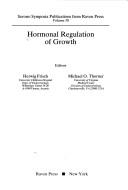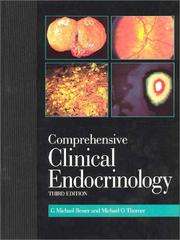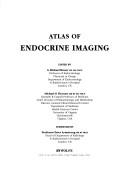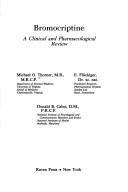| Listing 1 - 8 of 8 |
Sort by
|

ISBN: 9780881674262 0881674265 Year: 1989 Publisher: New York: Raven Press,
Abstract | Keywords | Export | Availability | Bookmark
 Loading...
Loading...Choose an application
- Reference Manager
- EndNote
- RefWorks (Direct export to RefWorks)
Somatotropin --- Somatomedin --- Somatostatin --- Growth Hormone-Releasing Hormone --- Growth Hormone --- Growth Disorders
Book
ISBN: 1627038795 1617799025 1617799033 Year: 2012 Publisher: New York : Humana Press,
Abstract | Keywords | Export | Availability | Bookmark
 Loading...
Loading...Choose an application
- Reference Manager
- EndNote
- RefWorks (Direct export to RefWorks)
Ghrelin, the endogenous ligand for the growth hormone secretagogue (GHS) receptor, is critical in the control of food intake and energy balance. The ghrelin receptors are now known to have important physiological properties as modulators of growth hormone release, appetite, glucose homeostasis, metabolism, immune function, neurotransmitter activity, cognitive function and neurodegeneration. Bringing all of this information together in the first comprehensive text on the topic, Ghrelin in Health and Disease provides a state-of-the-art synthesis of the latest work in this area for physicians and physician-scientists. This volume addresses the unique property of ghrelin as a modulator of function. Such a property provides potential utility for safe intervention in a wide variety of disease states. Indeed as we learn more about the basic physiology of ghrelin, the potential for treating new disease targets emerge requiring validation in the clinic. Each chapter in this volume is authored by a leading investigator in the field. The introductory chapter sets the background for the book and provides a superb overview of the relevance of ghrelin to physiology, describing how the discovery of ghrelin has prompted us to completely rethink traditional physiology. The authors conclude their chapters by critically addressing the future translational aspects of ghrelin biology and outlining what key basic research and clinical questions remain to be addressed. An invaluable resource, Ghrelin in Health and Disease distinguishes itself as the first comprehensive title covering all of the molecular and clinical issues relating to ghrelin and advancing our clinical understanding of obesity, growth, and reproductive pathogenesis.
Nutrition Therapy. --- Palliative treatment. --- Terminal care. --- Ghrelin --- Metabolic Phenomena --- Peptide Hormones --- Biological Science Disciplines --- Hormones --- Peptides --- Phenomena and Processes --- Natural Science Disciplines --- Disciplines and Occupations --- Amino Acids, Peptides, and Proteins --- Hormones, Hormone Substitutes, and Hormone Antagonists --- Chemicals and Drugs --- Physiology --- Metabolism --- Medicine --- Human Anatomy & Physiology --- Health & Biological Sciences --- Animal Biochemistry --- Clinical Endocrinology --- Physiological aspects --- Ghrelin. --- Motilin-related peptide --- Medicine. --- Immunology. --- Neurosciences. --- Nutrition. --- Endocrinology. --- Geriatrics. --- Medicine & Public Health. --- Geriatrics/Gerontology. --- Gastrointestinal hormones --- Peptide hormones --- Alimentation --- Food --- Nutrition --- Health --- Diet --- Dietetics --- Digestion --- Food habits --- Malnutrition --- Neural sciences --- Neurological sciences --- Neuroscience --- Medical sciences --- Nervous system --- Immunobiology --- Life sciences --- Serology --- Gerontology --- Older people --- Internal medicine --- Health aspects --- Diseases --- Health and hygiene --- Endocrinology . --- Nutrition .

ISBN: 072343185X Year: 2002 Publisher: St Louis : Mosby, Elsevier,
Abstract | Keywords | Export | Availability | Bookmark
 Loading...
Loading...Choose an application
- Reference Manager
- EndNote
- RefWorks (Direct export to RefWorks)
Book
ISBN: 9781617799037 Year: 2012 Publisher: Totowa, NJ Humana Press
Abstract | Keywords | Export | Availability | Bookmark
 Loading...
Loading...Choose an application
- Reference Manager
- EndNote
- RefWorks (Direct export to RefWorks)
Ghrelin, the endogenous ligand for the growth hormone secretagogue (GHS) receptor, is critical in the control of food intake and energy balance. The ghrelin receptors are now known to have important physiological properties as modulators of growth hormone release, appetite, glucose homeostasis, metabolism, immune function, neurotransmitter activity, cognitive function and neurodegeneration. Bringing all of this information together in the first comprehensive text on the topic, Ghrelin in Health and Disease provides a state-of-the-art synthesis of the latest work in this area for physicians and physician-scientists. This volume addresses the unique property of ghrelin as a modulator of function. Such a property provides potential utility for safe intervention in a wide variety of disease states. Indeed as we learn more about the basic physiology of ghrelin, the potential for treating new disease targets emerge requiring validation in the clinic. Each chapter in this volume is authored by a leading investigator in the field. The introductory chapter sets the background for the book and provides a superb overview of the relevance of ghrelin to physiology, describing how the discovery of ghrelin has prompted us to completely rethink traditional physiology. The authors conclude their chapters by critically addressing the future translational aspects of ghrelin biology and outlining what key basic research and clinical questions remain to be addressed. An invaluable resource, Ghrelin in Health and Disease distinguishes itself as the first comprehensive title covering all of the molecular and clinical issues relating to ghrelin and advancing our clinical understanding of obesity, growth, and reproductive pathogenesis.

ISBN: 1563755831 Year: 1993 Publisher: London : Wolfe,
Abstract | Keywords | Export | Availability | Bookmark
 Loading...
Loading...Choose an application
- Reference Manager
- EndNote
- RefWorks (Direct export to RefWorks)

ISBN: 0890044198 9780890044193 Year: 1980 Publisher: New York (N.Y.): Raven Press,
Abstract | Keywords | Export | Availability | Bookmark
 Loading...
Loading...Choose an application
- Reference Manager
- EndNote
- RefWorks (Direct export to RefWorks)
Book
ISBN: 1563755521 Year: 1994 Publisher: London Mosby-Wolfe
Abstract | Keywords | Export | Availability | Bookmark
 Loading...
Loading...Choose an application
- Reference Manager
- EndNote
- RefWorks (Direct export to RefWorks)
Book
ISBN: 0890044503 Year: 1980 Publisher: Raven Press
Abstract | Keywords | Export | Availability | Bookmark
 Loading...
Loading...Choose an application
- Reference Manager
- EndNote
- RefWorks (Direct export to RefWorks)
| Listing 1 - 8 of 8 |
Sort by
|

 Search
Search Feedback
Feedback About UniCat
About UniCat  Help
Help News
News